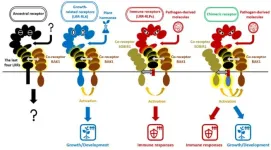Lifetime exposure to different types of traumatic events or stress appears to reduce the chances for optimal recovery after a stroke. A review of health records for U.S. stroke survivors found that sexual assault was consistently linked to worse physical functioning and poorer cognitive recovery measurements one year after a stroke. Embargoed until 4 a.m. CT/5 a.m. ET, Thursday, Feb. 1, 2024
DALLAS, Feb. 1, 2024 — Stressors and traumatic events experienced over the course of a lifetime may negatively impact subsequent stroke recovery; specifically, stroke survivors exposed to sexual assault at any point in their life had poorer physical functioning and cognitive outcomes one year after a stroke, according to a preliminary study to be presented at the American Stroke Association’s International Stroke Conference 2024. The meeting will be held in Phoenix, Feb. 7-9, and is a world premier meeting for researchers and clinicians dedicated to the science of stroke and brain health.
“It is important to know what has happened to a patient in their life when taking care of them post-stroke,” said lead study author E. Alison Holman, Ph.D., a professor of nursing and psychological science at the University of California, Irvine. “Screening for lifetime stress and trauma is important when caring for a patient who has had a stroke because those experiences often have far-reaching impact and may predict how well a person does over time.”
Researchers examined data from the STRONG (Stroke, sTress, RehabilitatiON, and Genetics) study to investigate specific types of stressors that may contribute to adverse physical function and cognitive outcomes one year after stroke. In the STRONG study, stroke survivors were assessed four times during the year. Assessments included the Lifetime Stress and Trauma Exposure survey, completed approximately 90 days after the stroke. Participants reported their lifetime exposure to 31 different types of stressful and/or traumatic events, including witnessing a loved one being injured or killed; sexual assault; divorce; emotional and physical abuse in childhood; and poverty. Additionally, one year after the stroke, participants were assessed for physical function and cognitive abilities. The researchers evaluated the relationships among lifetime stress and trauma exposure and functional and cognitive outcomes among 763 stroke survivors, average age of 63 years.
The analysis found:
Sexual assault was the traumatic event most strongly associated with a moderate decrease in the ability to perform activities of daily living and lower scores on the modified Rankin Scale (describes a person’s ability to function) and Telephone Montreal Cognitive Assessment scores one year after stroke, after controlling for age, gender, race and National Institutes of Health stroke scale score (a measure of stroke severity) three months after a stroke. Other adverse experiences – witnessing a family member be injured or killed; going through a divorce; and/or suffering childhood physical abuse – were also independently associated with a moderate decrease in ability to perform daily living activities one year after stroke. These associations remained even when early post-stroke acute stress levels were accounted for in the analysis. In contrast, taking care of a seriously ill loved one was associated with better scores on the Telephone Montreal Cognitive Assessment. Holman noted that people taking care of others are more actively engaged in everyday life, which may keep the mind sharper. Women were significantly more likely to report being sexually assaulted and having a seriously ill loved one. Holman emphasized that health care professionals should be aware of the potentially lasting physical health impact of sexual assault and other traumatic events that occur over the course of a person’s life. Understanding that these prior life experiences can shape how patients respond to a subsequent stroke may encourage more compassionate communication.
“Bad things happen to people, so the goal is to intervene in the immediate aftermath of the stroke to prevent its worst effects. We should be able to use this information to allocate resources in a targeted way to provide better support for people during post-stroke recovery,” she said. “Health care professionals can use psychological first aid strategies to support the patients’ basic needs, help them cope and refer them to resources such as a support group or community agency. Sometimes just acknowledging the experience is itself freeing.”
“This study raises our awareness of how important it is to manage stressors and to increase our physical and mental resilience,” said Randi Foraker, Ph.D., M.A., FAHA, vice chair of the American Heart Association’s Epidemiology & Cardiovascular Stroke Nursing Prevention Science Committee, and professor of medicine, Institute for Informatics, Data Science and Biostatistics and director, Center for Population Health Informatics at Washington University in St. Louis, School of Medicine, Missouri. “Some of the ways we can bolster our resilience and our wellness is to engage in mindful meditation, social engagement and physical activity. As clinicians, researchers and caregivers, we need to make sure we are giving stroke survivors their best chance at living longer, healthier lives.” Dr. Foraker was not involved in the study.
Study details and background:
The study included 763 stroke survivors (average age of 63; 41.3% female; 60.9% white adults). The STRONG study was conducted at 28 stroke centers across the U.S. from 2016-2021. The current study findings build on the STRONG study, led by Holman and her colleague Steven Cramer, M.D., that was previously published in the American Heart Association’s Stroke journal (Sept. 2023), which also suggested that cumulative traumatic stress exposure impairs recovery from stroke. The main study limitations were that patients with a severe stroke and those who did not speak English were excluded, so we do not know whether the findings would apply to those patients. Additional research is needed to investigate the potential mechanisms that link these traumatic events to worse outcomes after stroke. Holman suggests it is important to examine both psychological and physiologic processes that may explain the findings.
Co-authors, disclosures and funding sources are listed in the abstract.
Statements and conclusions of studies that are presented at the American Heart Association’s scientific meetings are solely those of the study authors and do not necessarily reflect the Association’s policy or position. The Association makes no representation or guarantee as to their accuracy or reliability. Abstracts presented at the Association’s scientific meetings are not peer-reviewed, rather, they are curated by independent review panels and are considered based on the potential to add to the diversity of scientific issues and views discussed at the meeting. The findings are considered preliminary until published as a full manuscript in a peer-reviewed scientific journal.
The Association receives funding primarily from individuals; foundations and corporations (including pharmaceutical, device manufacturers and other companies) also make donations and fund specific Association programs and events. The Association has strict policies to prevent these relationships from influencing the science content. Revenues from pharmaceutical and biotech companies, device manufacturers and health insurance providers and the Association’s overall financial information are available here.
Additional Resources:
Video interview with ASA volunteer expert, Randi Foraker, Ph.D., M.A., FAHA and other multimedia are available on the right column of the release link https://newsroom.heart.org/news/lifetime-exposure-to-sexual-assault-and-other-traumatic-stress-may-harm-stroke-recovery?preview=592f48641eb638e8961466e7907e33c3 After Feb. 1, view abstract poster WMP31 in the ASA International Stroke Conference 2024 Online Program Planner AHA news release: Young adults who experienced intimate partner violence may face higher cardiac risks later (Oct. 2022) AHA news release: Sexual assault, sexual harassment linked to higher long-term hypertension risk in women Journal of the American Heart Association Report (Feb. 2022) For more news at ASA International Stroke Conference 2024, follow us on X (formerly known as Twitter) @HeartNews #ISC24
###
About the American Stroke Association
The American Stroke Association is devoted to saving people from stroke — the No. 2 cause of death in the world and a leading cause of serious disability. We team with millions of volunteers to fund innovative research, fight for stronger public health policies and provide lifesaving tools and information to prevent and treat stroke. The Dallas-based association officially launched in 1998 as a division of the American Heart Association. To learn more or to get involved, call 1-888-4STROKE or visit stroke.org. Follow us on Facebook, X.
END

